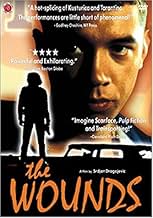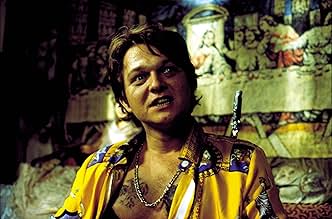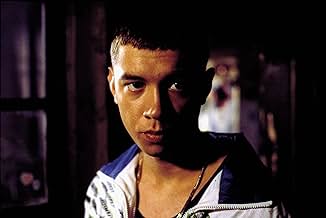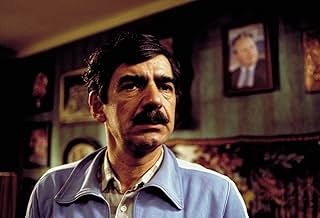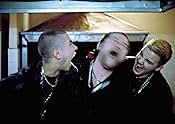Rane
- 1998
- 1h 43m
ÉVALUATION IMDb
8,0/10
12 k
MA NOTE
Ajouter une intrigue dans votre langueThis film follows two Belgrade youths on their rise to gangster legends in a decaying society.This film follows two Belgrade youths on their rise to gangster legends in a decaying society.This film follows two Belgrade youths on their rise to gangster legends in a decaying society.
- Prix
- 3 victoires au total
Predrag 'Miki' Manojlovic
- Stojan
- (as Miki Manojlovic)
Zorka Manojlovic
- Svabina baka
- (as Zora Manojlovic)
Radoslav 'Rale' Milenkovic
- Inspektor
- (as Rale Milenkovic)
Nikola Pejakovic
- Kafedzija
- (as Nidzo Pejakovic)
Avis en vedette
It's the disturbing reality of 2 working class youths in Belgrade: a life of crime. What makes this movie brilliant is that it does not romanticise our young criminals. Around the world, desperate youths turn to crime for survival and status elevation. We have it in South Africa. City of God tried to show it as it is in Brazil, but Rane has managed to capture the heart of it all. Humour and sincerity are at the heart of this film's success. It's powerful.
And the television show in the movie, where they interview criminals as heroes is not fantasy. This TV show was broadcast in reality. It's a weird world, but it is our world. Each moment of this film, you wonder if you should close your eyes, you anticipate something bad. Yet, I was totally inspired afterwards.
And the television show in the movie, where they interview criminals as heroes is not fantasy. This TV show was broadcast in reality. It's a weird world, but it is our world. Each moment of this film, you wonder if you should close your eyes, you anticipate something bad. Yet, I was totally inspired afterwards.
Dark, bleak, hopeless, harsh, uncompromising, periodically injected with black humor, but overall quite powerful - Srdjan Dragojevic's follow-up to "Pretty Village, Pretty Flame," weaves a tragic coming of age story in Yugoslav capital Belgrade during the turbulent 90's with all the sharp cultural, social, political references and critique one could ask for. This film actually fits more along the lines of "Cabaret Balkan," except that "Rane" has this gangster twist to it. Among the supporting actors I noticed a lot of familiar faces such as Miki Manojlovic, Dragan Bjelogrlic, Branca Katic, Nikola Kojo, who you may be familiar with from films like "Underground," "Black Cat, White Cat," above mentioned "Pretty Village, Pretty Flame" and "Cabaret Balkan" and such. Definitely recommended if you are interested in Serbia/Yugoslavia or Serbian film making.
Srdjan Dragojevic dedicates his film 'The Wounds' to "post-Tito generations," and it can be seen as of a piece with his previous film 'Pretty Village, Pretty Flame,' an allegory concerning the Bosnian conflict that was one of the angriest, most jarring anti-war films I've seen. 'The Wounds' is an even more aggressive film, told in non-linear fashion, like 'Pretty Village,' beginning in 1996, coiling five years back in time, and progressing to its starting point, so that the events that follow from thereon have an even greater immediacy. The storyteller is a young man named Pinki, born on the day of Marshal Tito's death, named such because his father was arrested after naming him "Tito" -- in honor of the fallen leader, but interpreted by authorities as an insult.
Pinki and his pal Kraut idolize a gangster known as Dickie, who lives in the same housing project. Dickie, an impulsive sociopath who carries a gun at all times and fires it into his television set at random, takes them under his wing and grooms them to become violent criminals. The film, by this point, may begin to remind a viewer of 'GoodFellas,' or the more current 'City of God,' from Brazil. But while those films were stylistically bold, this film is stylistically outrageous. Srdjan Dragojevic slings acid in the face of the viewer, forever surprising his audience with uncompromising nastiness. One does not grow inured to the shocks, however, because the shocks have poetry and relevance, and the movie is tremendously entertaining. This is very exciting filmmaking, the likes of which dwarfs recent work from American filmmakers like Scorsese and Tarantino. Furthermore, it's probably better than anything else from the arguably competitive recent spate of films from the former Yugoslavia, all of which yield a collective cry of anger in the face of the Bosnian civil war, the social conditions of that region, and the region's recent history.
Like other Yugoslav films, 'The Wounds' employs a burlesque tone in its depiction of sexuality, violence, social revolt, and family strife, and yet it does so with such conviction that the movie becomes hypnotic. It would be satire, except its anger is so palpable. It would be allegory, except its writing is so vivid. Whatever it is, it's not easily forgotten.
Pinki and his pal Kraut idolize a gangster known as Dickie, who lives in the same housing project. Dickie, an impulsive sociopath who carries a gun at all times and fires it into his television set at random, takes them under his wing and grooms them to become violent criminals. The film, by this point, may begin to remind a viewer of 'GoodFellas,' or the more current 'City of God,' from Brazil. But while those films were stylistically bold, this film is stylistically outrageous. Srdjan Dragojevic slings acid in the face of the viewer, forever surprising his audience with uncompromising nastiness. One does not grow inured to the shocks, however, because the shocks have poetry and relevance, and the movie is tremendously entertaining. This is very exciting filmmaking, the likes of which dwarfs recent work from American filmmakers like Scorsese and Tarantino. Furthermore, it's probably better than anything else from the arguably competitive recent spate of films from the former Yugoslavia, all of which yield a collective cry of anger in the face of the Bosnian civil war, the social conditions of that region, and the region's recent history.
Like other Yugoslav films, 'The Wounds' employs a burlesque tone in its depiction of sexuality, violence, social revolt, and family strife, and yet it does so with such conviction that the movie becomes hypnotic. It would be satire, except its anger is so palpable. It would be allegory, except its writing is so vivid. Whatever it is, it's not easily forgotten.
One of those in UR face, intense, violent pieces that U won't soon forget...tells the story of three youths and how their lives are shaped by their war-torn surroundings...never had any idea that this movie was going to be so RAW...whoa...a cross between "Natural Born Killers" and "Scarface"...
Actually it makes me feel sick, because it is so true.Man it really was like that.So now it's too painful to watch it.The life in Serbia isn't brilliant now, but I'm glad to see that the age from the movie is gone, and gone!Just to say that advertising of Rane was forbidden by "Milosevic TV"(RTS), and what an irony they had invested in the film. I would recommend it to anyone who wants to see how much of the crap hole life can be!
Le saviez-vous
- AnecdotesThe screenplay is inspired by true events experienced by Besa and Marko, two school fellows of Ivan Ivanovic, a famous serbian Tv comedian who hosts the renowned Talk Show "The night with Ivan Ivanovic".
- ConnexionsReferenced in Mi nismo andjeli 2 (2005)
Meilleurs choix
Connectez-vous pour évaluer et surveiller les recommandations personnalisées
- How long is The Wounds?Propulsé par Alexa
Détails
Contribuer à cette page
Suggérer une modification ou ajouter du contenu manquant



